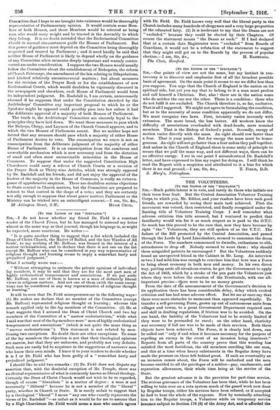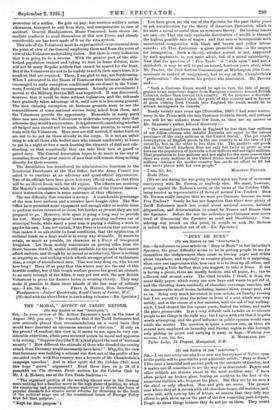THE VOLUNTEERS.
[TO THE EDITOR Or THE " SPECTATOR.1
Sm,—Much public labour is in vain, and rarely do those who initiate see their trees bear fruit. But the Central Association Volunteer Training Corps, to which you, Mr. Editor, and your readers have been such good friends, are rewarded by seeing their main task achieved. First the movement was vetoed, then restricted, and finally recognized under the limiting title of Volunteer Training Corps. I well remember What adverse criticism this title aroused, but I ventured to predict that familiarity would win for it as much respect as is paid to the O.T.C. So much has this proved to be the case that, now they have become by right " the " Volunteers, they are still spoken of as the V.T.C. The failure of the Bill promoted by the Central Association, and passed through the Lords by Lord Lincolnshire, seemed to announce the doom of the Force. The numbers commenced to dwindle, enthusiasm to ebb, attendances to drop off. Nobody seemed to want them : why should these misguided patriots be encouraged ? But the Volunteers suddenly found an unexpected friend in the Cabinet in Mr. Long. An interview or two I had with him was enough to convince him that here was a Force to bring about economy in both men and money. In his own direct way, putting aside all circuitous routes, he got the Government to apply the Act of 1863, which by a stroke of the pen puts the Volunteers just where they were before the creation of the Territorials, with one all- important proviso—there were to be no money grants. From the date of tre announcement of the Government's decision to
its application there has been considerable delay, delay which evoked criticism and has had some adverse effect. But let me at once say that there were more obstacles to surmount than appeared superficially. To transfer a self-governing Force, grown up out of autonomous units from villages and towns, to a great Government Department required care and skill in drafting regulations, if friction was to be avoided. On the one hand, the liability of the Volunteers had to be strictly limited if they were to be persuaded to enrol ; on the other hand, elasticity was necessary if full use was to be made of their services. Both these objects have been achieved. The Force, it is clearly laid down, can be called out " only if and when it becomes necessary for the purpose of repelling an enemy in the event of an invasion being imminent." Reports from all parts of the country prove that this wording has satisfied the most fastidious, the old members enrolling like one man, and this at a time when heavy enlistments in the Regular Army have made the pressure on those left behind great. If such an eventuality as an invasion comes about, the Force will be embodied and the men become entitled to all the privileges of a soldier—pay, emoluments, and separation allowances, their whole time being at the service of the State.
But the greatest advance is in the provision for part-time service. The serious grievance of the Volunteer has been that, while he has been willing to take over on a rota system much of the guard work now done by Regular troops, either his services have been refused, or if accepted he had to bear the whole of the expense. Now by nominally attaching him to the Regular troops, a Volunteer while on temporary service becomes subject to Section 176 (8) of the Army Act, and is afforded the
- protection of a soldier. He gets no pay, but receives soldier's ration allowances, transport to and from duty, and compensation in case of accident. General Headquarters, Home Command, have shown im- mediate readiness to avail themselves of this new Force, and already considerable use has been made of it on the rota system.
This aide of the Volunteers must be experimental—experimental from the point of view of the General employing them and from the point of view of the Volunteer undertaking duties. But there is every indication that it is going to be a success. With the greater part of the able- ' bodied population trained and taking its turn in home defence, there will not be many Regular soldiers that cannot be spared for the front. But if the Volunteers are not to be unduly taxed in their spare time, it is numbers that are required. These, I am glad to say, are forthcoming. When I advocated in the House of Commons that tribunals should be encouraged to make exemption conditional on enrolment in the Volun- teers, I received but slight encouragement. Actually an amendment I • moved to the Military Service Bill was negatived. It was discovered, however, that it could be done without legislation, and the tribunals have gradually taken advantage of it, until now it is becoming general. ' The men claiming exemption on business grounds seem to see the • reasonableness of some national service being asked from them, and the Volunteers provide the opportunity. Meanwhile in many parts these new men enable the Volunteers to undertake temporary duty that otherwise they-would have to refuse. It is quite worth considering whether all bodged men should not be made, where time permits, to enrol and train with the Volunteers. More men are still wanted, if undue burdens are not to be put on those already in the corps. It is not an unfair thing to ask all those able-bodied men who remain comfortably at home to put in a night or two a week learning the elements of drill and rifle- shooting, so that occasionally they can take their turn at guard or patrol duty. The Central Association hopes to do much in the way of recruiting from that great reserve of men that still remain.doing nothing directly for their country.
The Association has transferred its administrative functions to the Territorial Directorate at the War Office, but the Army Council has asked it to continue as an advisory and quasi-official organization. Two of its officials have been given honorary official rank, so that there will be no direct break with the old regime. The officers are receiving His Majesty's commission, while the recognition of the Central Associa- tion's instruction classes is some assurance of their efficiency.
The one difficulty that remains is money. A considerable percentage of the men have uniform and a number have bought rifles. The War Office- havo promised some equipment and enough rifles to enable thorn to perform duties entrusted to them, but further at present they are not prepared to go. However, civic spirit is going a long way to provide the rest. Many large provincial towns are providing uniforms out of municipal funds, while many a poor man is paying a shilling a week to parfor his own. I am not certain, if the Force is to retain that autonomy that makes it so adaptable to local conditions, that the application of national funds on a large scale is in every way desirable. It wants to retain, as much as possible, its character as a Force of recognized Irregulars. Let them mainly concentrate on getting rifles from the State, because the G.R. armlet is still available for the unite that cannot afford uniform, and though by no means as satisfactory, there is nothing so inspiring as, and nothing which affords stronger proof of enthusiasm than, a corps of ununiformed men. This war may drag on, who knows how long / Many of us pray that this winter may see the end of this horrible conflict, but if this trench warfare proves too great an obstacle to an early triumph of the Allies, it may yet rest with the new British Volunteers to prove the decisive factor in securing victory. They may snake it possible to drain these islands of the last man of military age.—I am, Sir, &c., Pmsor A. HAREM, Hon. Secretary. Headquarters—Judges' Quadrangle, Royal Courts of Justice, W.C. [We deal with the above letter in our leading columns.—ED. Spectator.]































 Previous page
Previous page